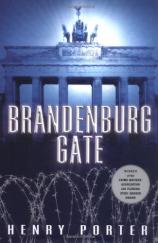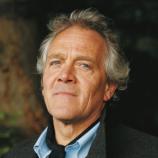Brandenburg Gate
Review
Brandenburg Gate
Middle-aged Dr. Rudi Rosenharte is about to see his former life as
a Stasi foreign agent turn his present life as a renowned art
historian upside down. The scene is set in East Germany in
September 1989. Rosenharte's passion at this stage is to set aside
the decadent alcoholic lifestyle he's lived for many years in order
to free his twin brother, Konrad, from a GDR prison. Konrad has
been mistreated by the Stasi and is in need of dental, physical and
mental treatment for his declining health. Rosenharte's energy is
to cooperate with the Stasi to ensure that Konrad lives and is
reunited with his wife Else and two young boys.
Rosenharte has become an authority in the art world and travels
frequently between cities to lecture. During trips to Trieste, he's
become acquainted with a person of interest to the Stasi officials
concerned with treason to the German Democratic Republic. Stasi
officials use information in ruthless fashion in order to
intimidate citizens to inform upon one another. Rudi's former life
as a secret agent comes to bear when he comes face to face with a
woman he believes to have died, a former love who possessed
important information against enemies of East Germany.
Believing that his cooperation with the Stasi will free his
brother, Rosenharte sets in motion a series of actions that
conflict with his chief goal, that of freeing Konrad. He possesses
the means to gain vital information not only for the Stasi but for
American, British and Russian agents as well. The game plays out
with his former lover, Annalise Schering, holding the key to
intelligence the Stasi must have. Rosenharte has to abandon his
former lover (or a reasonable facsimile of her) or become a
turncoat agent and cooperate with foreign agencies. He cannot
jeopardize Konrad's state in the process.
Henry Porter has written this spy novel in the fashion of a John le
Carre thriller and brings the reader along for a first-rate ride
back in time. The GDR experiences the tumult of a people long
oppressed by a police state, harassed with unemployment and
suppression of intellectual freedoms. The wall between East and
West Germany is a scene of protests, both silent and proactive.
Porter writes the times with political accuracy and develops the
characters with passion for their beliefs.
Stasi inquisitors are truly villainous. Western agents want
information and are willing to cross barriers to obtain it. A
surprising Russian presence solidifies the murky political waters
at the time of the fall of the Berlin Wall. Timing is crucial to
Rosenharte's success and coincides with the barriers broken between
East and West in Berlin. Characters are fictitious with the
exception of the Russian agent Vladimir, later known to the world
as Vladimir Putin.
At times, multiple plot layers make for tedious sleuth work on the
part of the reader. Difficult Germanic names and associations with
Nazi history take concentration to understand. When the tangles
unfurl into an understandable reality at the finale, one applauds
the author for a novel well done. Though fictionalized, one can
feel the climate of the historical date when Berlin became a free
city. BRANDENBURG GATE is a testament to those who sought freedom
from oppression. Espionage in the finest tradition.
Reviewed by Judy Gigstad on December 22, 2010











